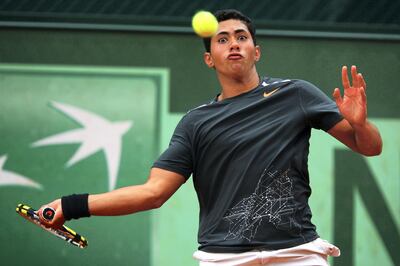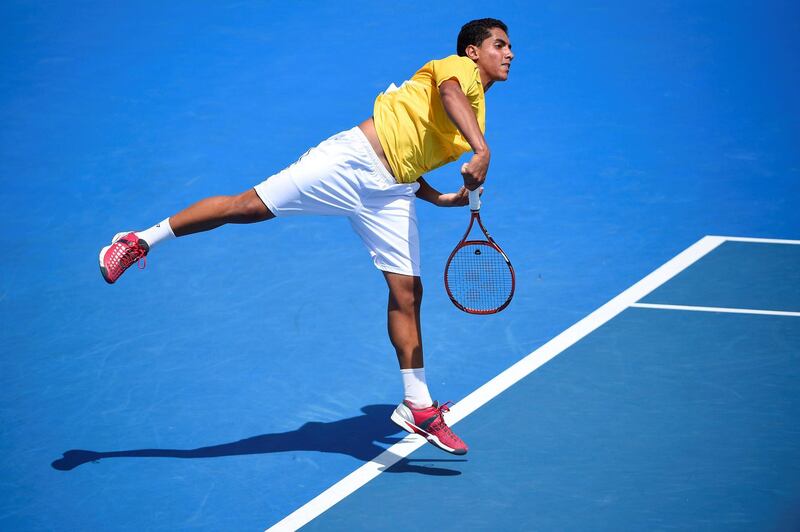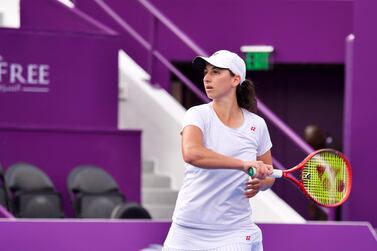When I first met Egypt’s Youssef Hossam at the Australian Open in 2016, he was a talented 17-year-old ranked 19 in the world at junior level, boasting a big forehand and a flashy one-handed backhand.
He was seeded 12 in the boys’ singles event in Melbourne that fortnight, and made it to the third round before falling to Australian Alex de Minaur, who is now a top-30-ranked ATP player.
Hossam had lofty goals at the time and would become the first Egyptian in the Open Era to break the top 10 in the world junior rankings just three months later.
He believed he could replicate that feat at the senior level too.
“If not top 10 – even though I believe it’s achievable – then I’d like to be a top-50 player and play Grand Slams, make it far in the slams. I believe I can go there, I don’t see it as mission impossible,” he told this writer in Melbourne.
When he broke into the top 300 by winning five ITF titles in his first full year as a pro in 2017, it seemed Egypt might actually get its first top-100 player since 1978.
Earlier this month, the Tennis Integrity Unit (TIU), the sport’s anti-corruption body, announced that Hossam, now 21, had received a lifetime ban for committing multiple match-fixing and corruption offences.
The TIU determined that between 2015 and 2019, Hossam “conspired with other parties to carry out an extensive campaign of betting-related corruption at the lower levels of professional tennis. This involved 21 breaches of the Tennis Anti-Corruption Program”.
Those breaches included eight cases of match-fixing, six cases of facilitating gambling, two cases of soliciting other players not to use best efforts, three failures to report corrupt approaches and two failures to co-operate with a TIU investigation.
The news comes just two years after Youssef’s older brother, Karim, was hit with the same ban for multiple match-fixing offences. Karim was also a promising junior (he peaked at 11 in the world junior rankings in 2012), with lots of unfulfilled potential.
Last August, a third Egyptian, Issam Taweel, was slapped with a five-year ban and a $15,000 (Dh55,000) fine - two years of the ban and $13,000 of the fine are suspended - by the TIU.
Three convictions in three years has put Egyptian tennis under the spotlight for all the wrong reasons and you wonder if more cases will come up in the future. Is there perhaps an even greater risk that players would turn to match-fixing when tennis resumes after this coronavirus-enforced shutdown is over?

Corruption in tennis is widespread and by no means exclusive to a single country or region. But in light of recent revelations, it’s time for the Egyptian Tennis Federation (ETF) to act, and act fast. While the decision to fix a match is an individual choice, the federation should do more to educate players on the punishments and measures they can take to report any illegal approaches. A mandatory course on tennis integrity should be taken by all players under the federation’s umbrella, in consultation with the TIU.
ETF board member Hassan Elaroussy says an educational visit from the TIU has been on the agenda since last year but is now postponed due to the coronavirus. He is trying to arrange a webinar with the TIU instead.
"We will work on a plan with them to educate, not only the players, but also the parents and coaches, about this issue. Because of course it's a big issue, and it's not just in Egypt," Elaroussy told The National last week.
Elaroussy said that the onus to educate players is not only the responsibility of the federation.
“It’s not only the federation, in my opinion, it’s the parents," he added. "The parents are with the kids, are with the players, if they see something wrong, they should be the first ones to come in and say, ‘hey, my 16 or 17 year old is doing something wrong when it comes to integrity’.
“I think that’s the source of the problem. I see these kids as victims of quick cash and no supervision. The federation cannot supervise these kids and see what they’re doing on their laptops at night. We have no control.”
There are many Egyptian players who are now concerned about the reputation of the sport in the country and wish to send out a clear statement to anyone questioning their integrity.
“Not everyone is the same. Egypt is a country of over 100 million people with so many people playing tennis, and not everyone will make these mistakes,” said Sandra Samir, Egypt’s No 2-ranked player.
“Just because two or three people made mistakes, that doesn’t mean that Egyptian tennis is full of match-fixing. Egypt is not the epicentre of match-fixing.”
Samir believes most female players are risk-averse when it comes to corruption in sport and gives credit to her parents for instilling in her a strong code of ethics she has stuck to throughout her career.
Most Egyptian players looking to break through head to the Red Sea resort city of Sharm El Sheikh to contest the $15k and $25k ITF tournaments staged there almost every week, all year round. The rise in corruption places a question mark on such events, and whether there is enough supervision at those and other tournaments.
“It’s not just Sharm El Sheikh that is problematic; Futures in Tunisia and Antalya, for example, also have issues," explains Samir, 22. "Surely there is match-fixing there. Resort tournaments in general can have match-fixing because they are not supervised well. There are some players who go play those tournaments just for fun, and they’re not really full-time tennis players.
“But I must say that in recent years the supervision has improved, and they are strongly enforcing rules at the tournaments in Sharm El Sheikh, like not having phones around the court and stuff like that.
“Still, the willingness to match-fix at the lower levels will remain high because the prize money is very low. You lose in the first round and you practically make no money [$156], which means if you’ve spent two nights at the tournament hotel, you’ve already lost all the money you made that week. And if you’re playing there the following week, you’re spending a whole week paying for accommodation and not playing any matches.”
Samir, who grew up playing alongside the Hossams, feels “sad” for both brothers, but acknowledges that their mistakes can prove to be an important lesson for others who might be tempted to follow their path.
“These lifetime bans are a cautionary tale for all players, but it’s also a wake-up call for the federation, that if you don’t start supporting your players more, your reputation will be ruined,” Samir added.
Indeed, the ETF should take a closer look at the current structure of support it offers its players, and whether there are better ways to alleviate the financial burden of being a professional on tour. At the very least it should provide proper guidance.
Elaroussy agrees that the recent bans are a “wake-up call” but also notes how the federation got Youssef a $25,000 grant from the ITF, and “put a lot of time and effort” to help further his career.
“The federation is speaking about the $25,000 grant Youssef got from the ITF. I received $12,500 from the ITF as well,” said Samir.
“I’ve been getting them in $2,500 installments every three months. That’s not the best set-up, because you need more at once to pay a coach to travel with you, or to cover your own expenses. It’s not as helpful as you think it is.”
With Youssef now banned, Egypt currently has just two male players ranked in the top 1,000 – Mohamed Safwat and Karim Mohamed Maamoun. The North African nation will have to play Davis Cup matches with a depleted squad while it waits for young talent to emerge. Until then, it would be wise for the ETF to use this time to reflect, analyse, and plan for a better, and cleaner, future of the sport in Egypt.







